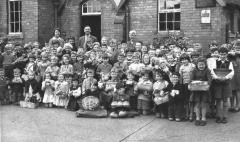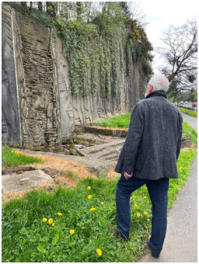

Chaddesley’s Origins
The village of Chaddesley Corbett is an ancient settlement with a prehistoric buriel mound and traces of a Roman road. Originally known as Chaddesley the name is thought to mean "Ceadda's clearing in the wood" and is first mentioned in a Saxon Charter of 816 when the land was given to the Bishop of Worcester in return for hospitality to the King of Mercia and his men. It is mentioned in the Domesday Book as belonging to a Saxon Noblewoman - and had two priests, several corn mills, a population as large as Kidderminster and two saltpans in Droitwich for it's own use. After the Norman Conquest the Manor of Chaddesley was owned by the Corbett family who added their name to it’s title. Later, church lands passed to the Earldom of Warwick and, eventually, to the Throckmortons of Coughton Court.History
History Society
Non-members welcome (£5 fee payable) ~ Zoom connection also available
The contact details for Chaddesley Corbett History Society from Freda Griffith 077476 18 487 fred@fredagriffith.co.uk ___________________________________________________ Lectures held in Chaddesley Corbett Village Hall (DY10 4QA) - with a Zoom option too! Enquiries to Freda Griffith 07747 618487 or fred@fredagriffith.co.uk Download schedule
Contemporary History
Chaddesley Woods in Chaddesley Corbett became a Nature Reserve in 1973 through the generosity of Mr. John Cadbury. The reserve consists of 53 hectares of native oak woodland and 47 hectares of recent plantations of young hardwoods and softwoods - which were added to show how wild life conservation can be intergrated with modern commercial management. A "Jubilee Walk" was introduced in 1977 to mark the 25th anniversary of the Queen's accession to the throne. The walk is marked by yellow arrows - which indicate public rights of way - and by white arrows which indicate courtesy paths. There are Voluntary Wardens for the woods and the area is managed by the Nature Conservancy Council. The Woods are a special feature of the area and attract many visitors all through the year. • Car parking by the roadside. • Guard against thefts. ____________________
© webdesign@chaddesley-corbett.co.uk - 2024

Chaddesley - in Dec. 1944
2nd. Chaddesley church has suffered a severe loss with the death of Mr. John Hemming, Sexton for 60 years, with a kindly manner of welcoming people into church. The friend of all and a great player of the church bells by the carillon method - a type of keyboard - which gave a cheerful opening of each Sabbath Day. Wet weather has brought agricultural work to a standstill Christmas Greetings have been arriving from battlefields abroad with local lads giving expression of their thoughts - within the limits of censorship. 9th. 30 shillings has been given from The Talbot Gifts Fund to each serving man or woman. Mrs. Joseph Morris of Clattercut Land died suddenly (aged 82). 16th. Evacuees are starting to return to their own homes. A few of the children are still among the Chaddesley scholars. A sharp frost rendered most road surfaces treacherous and Mr. Harry Day suffered a broken leg when falling off his bicycle at Brockencote. 23rd. Chaddesley celebrates, by custom, the Feast of St. Thomas, with charitable gift-giving, provided by generous bequests from former parishioners - Lady Mary Yates, Margaret Delabere, Jonathon Harrison and John Giles, amongst others. Before they departed for the Christmas holiday the school children enjoyed a marvellous dinner and tea in the canteen. 30th. Christmas had been quiet given the reduced homecoming to Chaddesley homes because of the war. ____________________________________________________ What passes for “Humour” in Chaddesley Many will remember the Cobbler (who doubled as the Postman) with his blunt query - “Have ye brought thee money ?” “N0 ?” “Then thee boots’ not done !” _____________________________________ Others might remember “Big Head”, who drank at ‘The Talbot’, who always knew better, been there, done that, more times and more frequently than anybody else. Thinking to give him a lesson, someone lay in wait in a newly dug grave, with a white sheet draped over him. Along comes “Big Head” and said fellow stands up and complains “.. Oooo, I am feeling cold !” thinking to scare the man. But Chaddesley beer is strong beer (and makes brave men of us all !) So “Big Head” remarks “..No wonder thee’s cold, thee’s got no dirt on thee !” and proceeds to kick soil over the poor man in an attempt to bury him, requiring help from those gathered behind nearby tombstones waiting to see what happened ! ___________________________________ One lad, who ‘specialised’ in snatching other’s drinks, got his ‘come- upance’, when a glass of liquid paraffin with fruit dye was downed in one gulp .. and left the lad sincerely regretting it, for some time after ! ____________________________________ A 1922 visit from the Birmingham Tramways Sports Club resulted in Chaddesley wins for both Bowls and Cricket Teams .. and a challenge to a drinking match. The Landlord asked “ .. first visit the Chaddesley then .. ?” “Thought so .. !” “The Brewery hasn’t got sufficient beer for that competition !” _____________________________________
And
not
forgetting
the
large
rings
which
were
set
into
the
sandstone
banks
of
the
main
road
as
it
approached
Bromsgrove
-
by
Battlefield
House
-
from
which
chains
were
to
be
slung
to
prevent
‘The
Jerries’
from
driving
towards
Chaddesley !


The Society is pleased to announce that a history of the parish from 1900-1950 i
published in July.
On 14 May 1940, Secretary of State for War Anthony Eden announced the
creation of the Local Defence Volunteers (LDV)—later to became known as
the Home Guard. Far more men volunteered than the government expected
and by the end of June, there were nearly 1.5 million volunteers.
One of their first tasks was to create a first line of defence for rural
communities.
In 1940 there was great concern in the government that invasion was
imminent. So the War Department sent out an order to all LDV brigades to
make home-made anti-tank obstacles to be put in the middle of the road to
hamper the progress of enemy tanks in the event of invasion.
Each village had their own ideas about shape and design. Olive Mason
recalls the Chaddesley LDV brigade made four; two for the top of Briar Hill
and two for the entrance to the village outside the Police Station. They used
easily obtained 4 ft diameter concrete drainage pipes, stood them on end
and then filled them to the top with concrete. The iron bar (seen in photo
above) was to be used to attach large steel chains between the blocks.
Remarkably, two of Chaddesley’s ‘obstacles’ have survived and can still be
seen exactly where they were left 80 years ago ─ in the snowdrop orchard
opposite the Old Police Station, in the village street. Many of us have
probably walked or driven past them hundreds of times and not realised
what they were under their annual canopy of nettles.
_____________________________________________________________

Harvest Festival Offerings
Chaddesley school
60 years ago
Can ‘locals’ spot familiar faces ?
February 19
Great Wall of Kidderminster, Michael Loftus
March 19 (AGM)
Bessie Blount of Kinlet, Robert Hodge
April 16
Beyond the Seas, David Clark
May 21
Diary of William Lea, Vanessa Morgan
September 17
King John, Max Keen
October 15
Bourneville Bob Booth
November 19
World War II Christmas, From Time to Time
Wednesday February 19th - 7.30pm
Michael Loftus
The Great Wall of Kidderminster
The
wall
is
something
we
drive
past
on
a
regular
basis,
but
once
you
know
the
story
of
the
artist
who
had
the
inspration
and
the
councillors
seemed
to
see
the
sense
of
investing
in
quality
you will understand this amazing legacy.





















